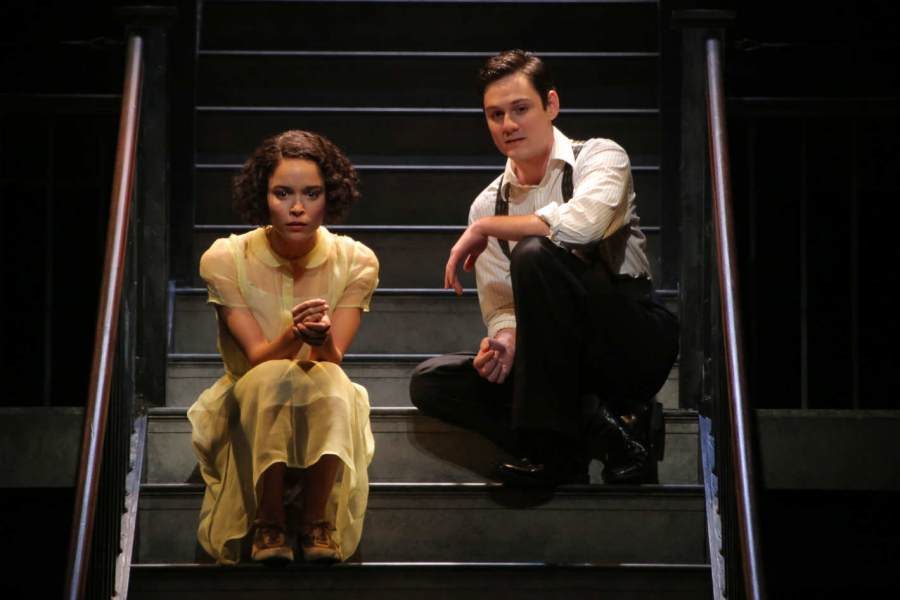

After nearly a decade away, Adrienne Kennedy reasserts herself as a singular, seminal voice in the American theatre with He Brought Her Heart Back, now onstage at Polonsky Shakespeare Center’s Theatre for a New Audience. In barely 50 minutes, the play — Kennedy’s first since 2008’s Mom, How Did You Meet the Beatles?, which she co-wrote with her son, Adam — offers a potent, poetic rumination on the personal and historical traumas we still seem doomed to repeat.
To prepare for my first performance from the (perhaps reductively) dubbed doyenne of African-American drama, I dove into her early works, including her Obie Award-winning, 1964 debut, Funnyhouse of a Negro. They are intimidatingly dense plays, rich with shapeshifting characters; enigmatic stage directions and set design; and allusions to the biblical, historical, and mythological. They invite close study, and are therefore often cloistered in university classrooms.
Yet this intellectual approach belies the gut-level impact of watching a Kennedy work unfold in real time. Though He Brought Her Heart Back gradually unmoors itself from time and place, it anchors on lovers Chris, played with great humanity by Tom Pecinka, and Kay, played with aching grace by Juliana Canfield, who, at the start of the play in 1941, declare their love and decide to marry. Kay is still in school, so when Chris leaves their rural Georgia town to try and cut it on the New York City stage, they begin to write each other letters. “When you finish school and the war is over, we will live in France,” he promises, recalling, and at one point singing a piece from, Bitter Sweet, the 1940 romance film based on Noël Coward’s operetta.
Director Evan Yionoulis, who helmed a 2007 production of Kennedy’s Ohio State Murders, handles the production tenderly and incisively, drawing out the play’s central yearning by erasing and abruptly widening the distance between our lovers. Because though their love is patient, gentle, and true, it is rent asunder by impossible forces — not only the looming specter of WWII, but the briars of race and family legacy.
The lover’s exchange gives way to memory play, as the pair, in turn, meditate on family history, often slipping into the voices of their kin. Kay, born of a black mother and white father, is trying to make sense of her mother’s death not long after she was born. Some say she shot herself, others swear Kay’s father murdered her — that he followed her up north to Cincinnati, cut her heart out, and brought it back to Georgia in a green, glass box.
Chris is the only legitimate child and heir of Harrison Aherne, one of the wealthiest men in town, who built the first bank and owns vast peach orchards. Chris loves his father but wrestles with jagged fragments that don't seem to add up. Harrison put his three ‘colored’ children through school, built a colored cemetery, and gave their mothers beautiful tombstones. But he brought young Chris on strange trips to Germany, pioneered efforts to segregate the city he helped build.
The now 86-year-old playwright’s recent interview with Alexis Soloski in the New York Times calls attention to the personal fragments she wove into the text: as a girl, she spent summers in Georgia. Her white maternal grandfather was a big man in town who owned a peach orchard. Her maternal grandmother died young. Kennedy also addresses this history in “Forget,” a poem originally published in Harvard Review 49 and reproduced on an insert in every Playbill for the current show. She writes of her grandfather, “Like the South itself, he was an unfathomable. mixture of complexities.”
This complexity seems to trap us, and Donald Holder’s lighting design illustrates that even motion is an illusion — elevators open not onto the warmth of home but onto unspeakable violence; the rattle of a train car calls to mind not the possibility of escape but the inescapable grasp of Jim Crow; even the flowing river portents horror.
In one of the play’s most upsetting passages, Chris recalls seeing corpses float down the river, shot minutes after being baptized in waters too close to a white man’s property. And as Chris follows this with his memory of first seeing Kay, we recognize that the world of their love and the world in which they grew up are inextricably linked.
Kennedy does not offer us a rosy lens with which to view our nation’s past or present. She seems to posit, in a voice a firm as ever, that though we must, as Chris and Kay so feverishly attempt to do, acknowledge the rot at the core of our nation’s past and present, acknowledgment alone will not provide salvation.